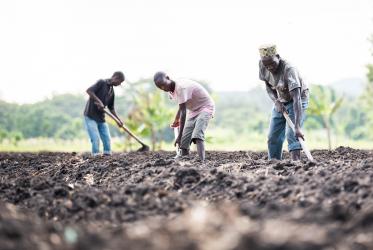As he newly arrives in his position, it is at a time when the WCC has been renewing its understanding of ecumenical diakonia. Mtata said that inspires him.
“The last two decades or so have seen a renewed interest and commitment to ecumenical diakonia,” he said. ”Ecumenical diakonia as cooperation to stimulate the agency of those in vulnerable states to stand on their feet is urgent today where many remain trapped and paralyzed by poverty, displacement, oppressive governments, and violent conflict.”
The WCC is able to support the strengthening of local capacities as well as global-level coordination, Mtata added. “Such capacities and linkages are valuable today because we are dealing with very complex and interconnected challenges,” he said.
He will strive to help WCC member churches strengthen their commitment to public witness and diakonia on every level. “Churches are in different contexts but are all dealing with situations that put a new demand on their public witness and diakonia,” he said. “There are churches in circumstances where there is recession of democratic governance, minority situations, repression, disregard for human dignity.”
He believes that the WCC is specially positioned to create a space for mutual learning and solidarity.
“The WCC must create opportunities to understand how local experiences are connected to global relationships,” said Mtata. “The WCC must therefore support the capacity of local churches to be able to act locally in a way that is theologically coherent but also ecumenically accountable.”
The WCC should also be a space of sharing resources to enable ecumenical diakonia and public witness, he added. “Our support for member churches' engagement should be at three levels that have been used in liberation thinking namely, see, judge, and act,” he said. “Churches must develop their capacity to see what is happening by being able to observe facts as well as being able to name that which is happening in their own contexts.”
In his view, the task of the WCC is to make sure the churches develop this capacity to understand the conditions in which they find themselves. “This will require the use of various tools to enable the churches’ truthful articulation of the conditions that threaten fullness of life,” he said. “Secondly, the church must be able to assess and judge for the perspective of God's word what is happening.”
Theology is a resource that helps the church to look at the conditions of life in light of God's word, he reflected. “Third, the church does not only name the conditions and judge them as life-giving or life-denying,” he said. “The church as a witnessing and diaconal community must take transformative actions in light of its collective judgement.”
This third dimension of ecumenical diakonia and public witness relates to organizational and institutional integrity, he explained. “Here we are looking at how our churches as organizations are run in accountable and inclusive ways so that their witness has integrity,” he said. “This also relates to the strengthening of the leadership of our churches and their diaconal arms.”
He also shared his vision of how the WCC can promote a society that respects the full humanity and dignity of all. “The vision of full humanity and dignity for all people is at the center of Christian self-understanding,” he said. “This is also shared with people of other faiths and those of no faith who are committed to the inherent worth of every person as an individual and in their communities.”
He envisions a WCC that contributes to a sharpening of understanding of all the forces that compromise human dignity. “I envision a WCC where the differences of people according to race, gender, age, and physical ability, are not the basis of how they should be treated,” he said. “I envision a WCC where our theological self-understanding and respect of human rights are foundational to all our pursuit for human dignity.”
The commitment to human dignity predates the ecumenical movement, he pointed out. “I, therefore, envision a WCC in which at local levels and global levels, our member churches together commit to uphold human dignity within the church as well as working together to promote the same in society,” he said. “This can happen when churches speak out when such dignity is compromised and use the available protection mechanisms.”
He also envisions a WCC that cooperates with like-minded organizations to promote human dignity at regional and global levels. “The WCC has a long history of addressing inequality in the world as a result of unjust systems that get perpetuated by inaction,” he said. “The resurrection story is God's statement that God desires life and therefore summons us to take action that is hope giving.”
Hope must therefore not be only about positive thinking or verbalization, he noted. “It must be a collective orientation of the mind and collective action to transform unjust systems,” he said. “This is hope giving.”
He maintains hope when more and more people are willing and committed to come together as a fellowship to pursue an agenda for an equal world. “Many people's hope is challenged by growing inequality,” he said. “My hope comes from the work the WCC and its partners have been carrying out to address economic inequalities, gender marginalization, and exclusion of people with disabilities.”
He is also hopeful because he knows that the possibility of transformation of inequality does not solely depend on our actions. “God's ultimate purpose is to realize equality and justice despite our limitations,” he concluded.












